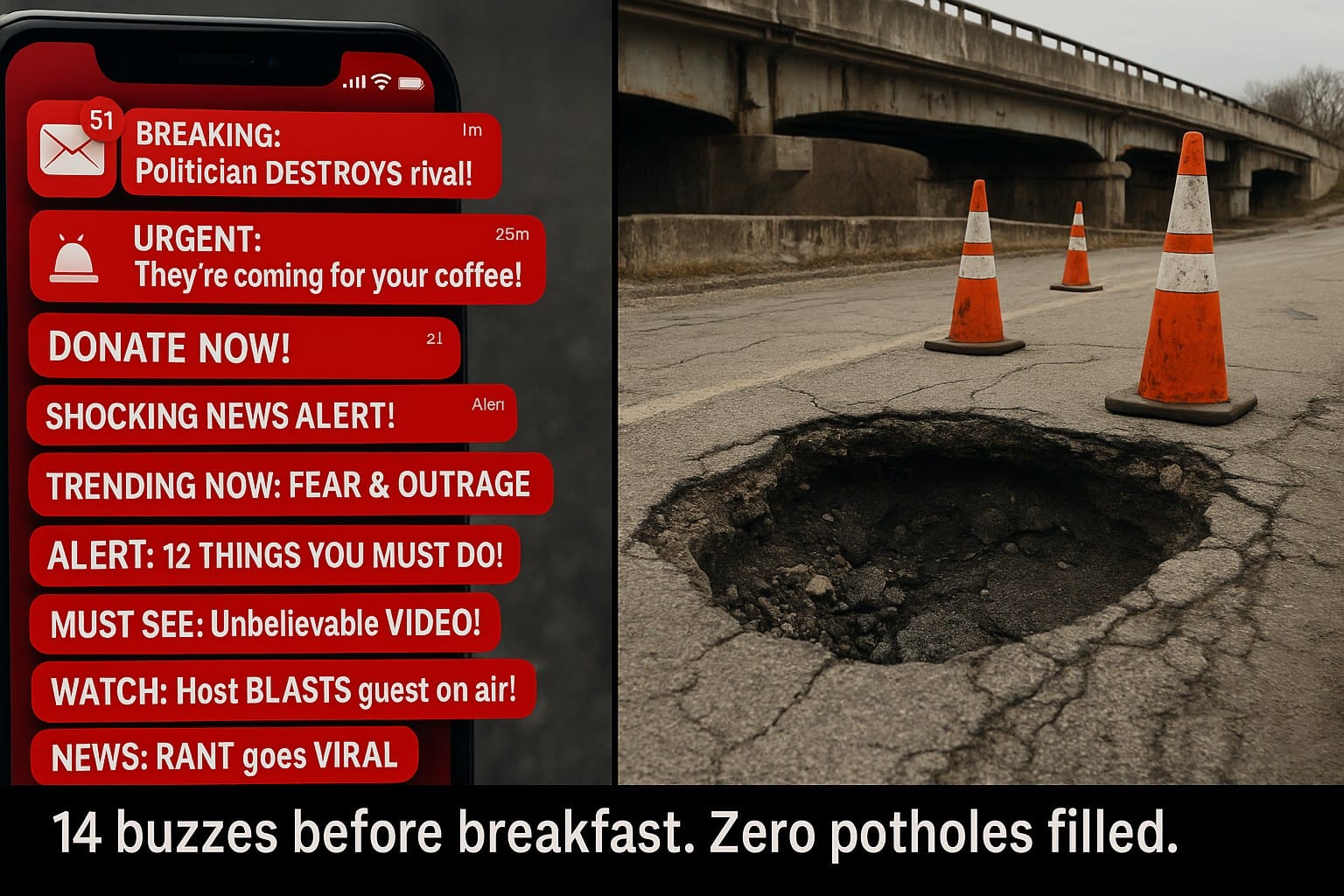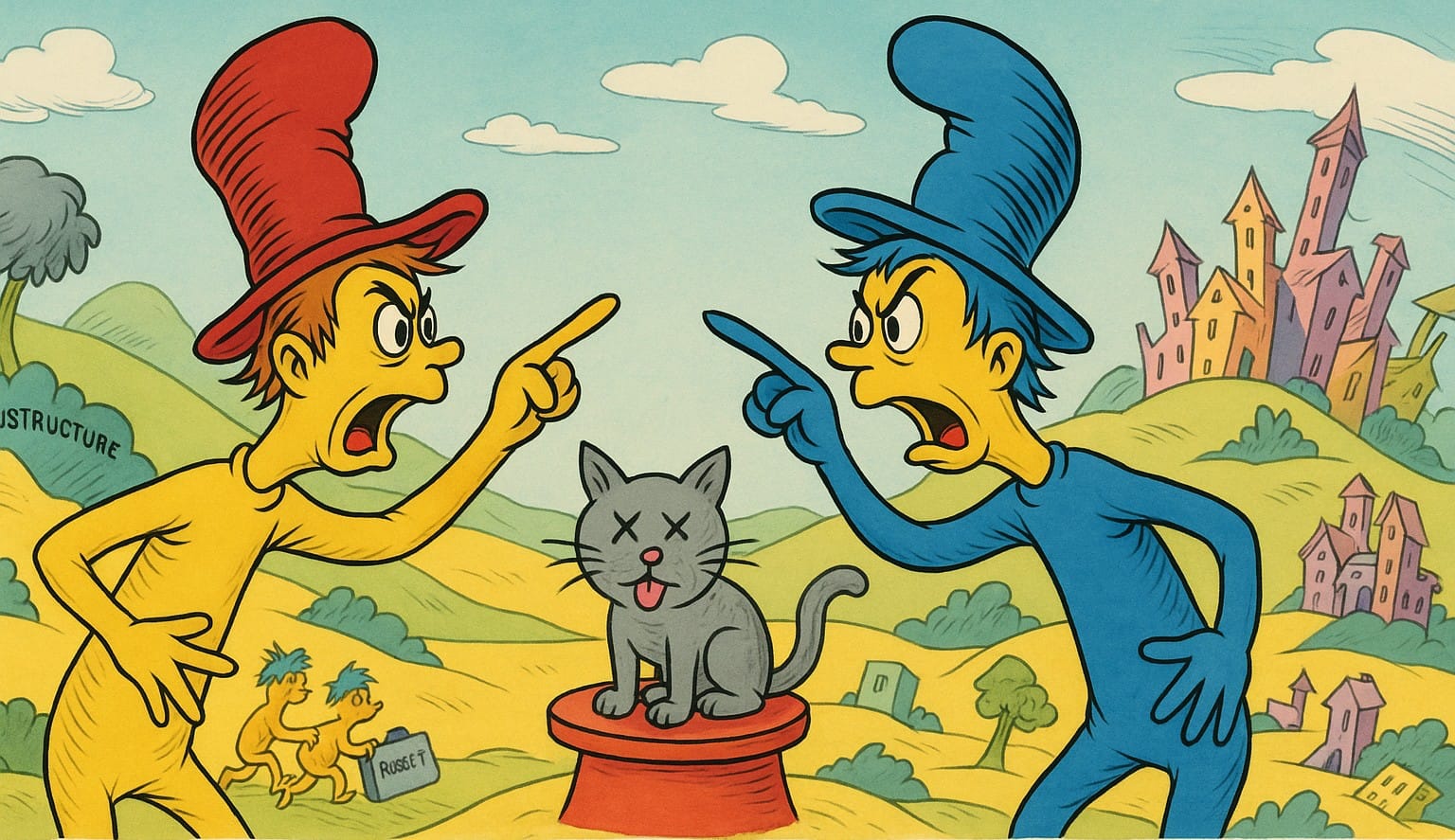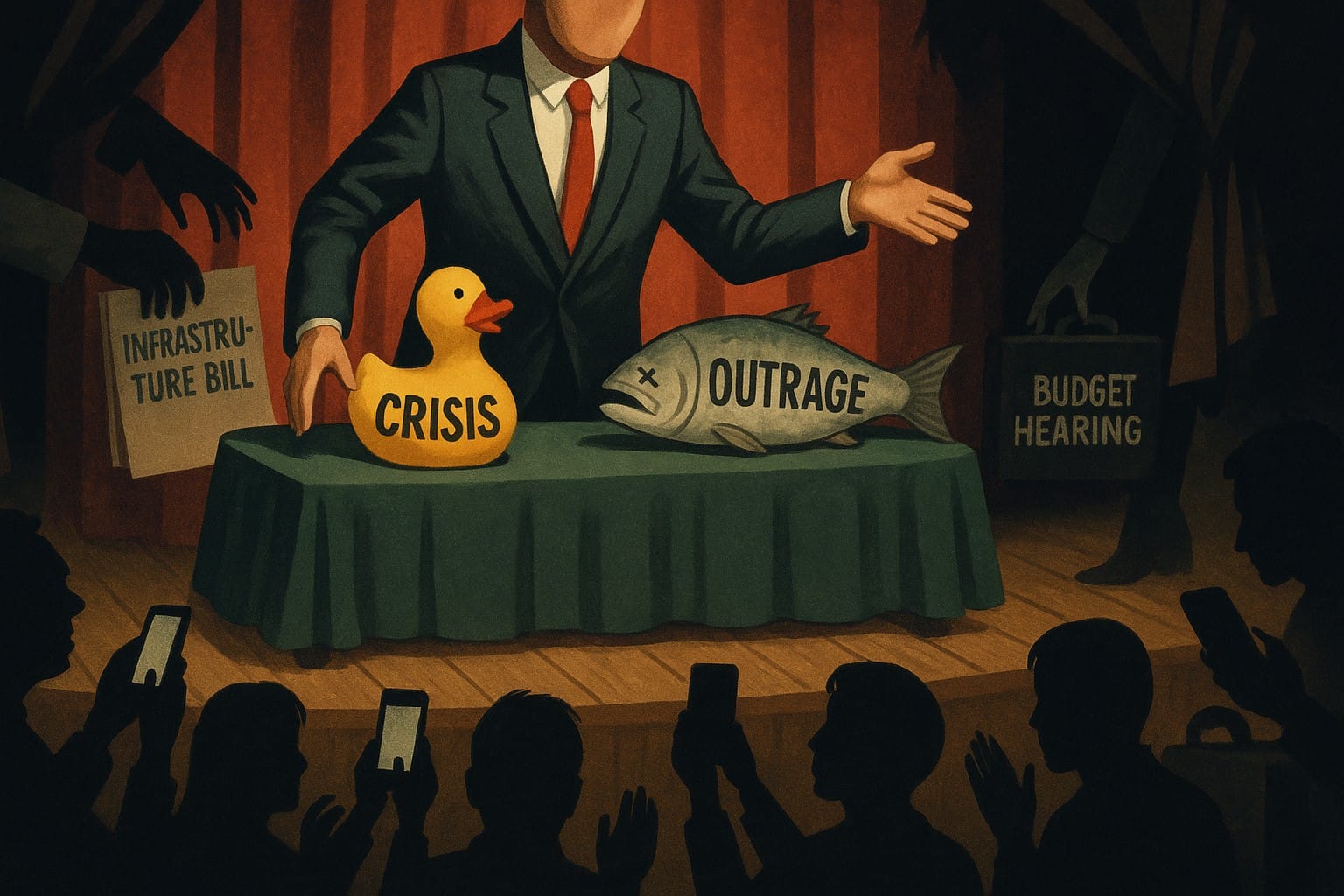Before breakfast, your phone buzzed 14 times. A congresswoman "destroyed" a witness in a hearing clip. A cable news host demanded an apology for a statement that was never made. A rival political party was accused of plotting to ban your favourite coffee maker. Your screen glowed with existential threats, tribal dunks, and urgent pleas for a $5 donation to "fight back."
Here's the kicker: Did any of those alerts help fill a pothole on your commute, pass a national budget, or inspect the safety of a nearby bridge?
If attention is the new currency, we're bankrupting competence.
We're not lacking policy problems—God knows we have plenty. We're suffering from a collective case of political ADHD. In the competition for your next swipe, the shameless always beat the competent. And that's not a coincidence of the internet age. It's the point.

The Cast of Characters (Or: How to Spot the Con)
Picture this mess as a three-person con game playing out on your phone every single day. Once you see the pattern, you can't unsee it:
The Players | What They Are | Their Role in the Scam | What Dies in the Process |
Red Hat | One partisan team | Performs spectacular outrage to energize their base and open wallets. | In their one-person show, policy becomes a prop. |
Blue Hat | The other partisan team | Frantically mirrors and escalates because nobody wants to lose the attention game. | Governing becomes pure reaction, like a Twitter fight. |
Dead Cat | The latest crisis that has been manufactured | Gets thrown on the table whenever someone needs to change the subject fast. | Your brain gets hijacked and real problems get ignored. |
It's like watching a magic show where the magician yells about the rabbit while someone else picks your pocket. Red Hat waves an outrageous prop, Blue Hat takes the bait and amplifies it, and while you're watching this performance, the actual government business gets done in the shadows—or doesn't get done at all.
The dead cat is the real star here. You know that friend who changes the subject when they're losing an argument? Same energy, but weaponized by people with Twitter accounts and campaign war chests.
How We Got Here (Spoiler: It's Not Pretty)
Here's the thing that'll make you want to throw your phone in a drawer: both sides are feeding the same machine. Red Hat throws the firecracker, Blue Hat quotes it to dunk on it, and the algorithm treats both as engagement gold. Meanwhile, democracy dies twice—once from the wasted time, once from the lost trust.
The system runs on one simple, depressing truth: attention is finite, but outrage is rocket fuel.
Think about your brain for a second. On a good day, you've got eight hours of focus in you. Your lizard brain constantly scans for threats, treating "BREAKING: Local Man Says Thing About Other Thing" with the same urgency as "BREAKING: Actual Tiger in Your Kitchen."
Years ago, political operatives figured this out. Why spend months crafting a nuanced position on supply chain reform when you can say something inflammatory about gas stoves and watch the clicks roll in? It's like choosing between doing your taxes and scrolling TikTok—outrage always wins because it's easier for your brain to process.
Social media platforms exploited this human psychology quirk for a business model. The algorithm doesn't care if your post is accurate, helpful, or good for democracy. It only cares if people react to it. A thoughtful five-minute explainer on municipal bond financing? Algorithmic poison. A 15-second clip of someone screaming about "radical woke coffee"? Digital cocaine.
We've created a political landscape where governing well is a competitive disadvantage. The skills to run a country—patience, nuance, admitting mistakes—get you ignored online.
The Shameless Get Rewarded (While the Rest of Us Get Played)
So here's where it gets wild. We've accidentally created a Shamelessness Premium—a system where the biggest jerks get the biggest rewards.
Picture a boring Tuesday in Congress. Representative Serious is in a four-hour hearing explaining why our water infrastructure is held together with duct tape and prayers. She's got charts, data, and solutions. Her clip gets seen by maybe 2,000 people, mostly policy wonks.
Cut to Representative Showboat in the same hearing. He ignores the water crisis, pulls out a Dr. Seuss book, and delivers a barn-burner speech about "protecting our children from radical story time." That 30-second tantrum gets 2 million views, three cable news segments, and a fundraising explosion that crashes his campaign website.
The math is brutal: serious policy work gets you academic citations, while political theatre gets you money, fame, and prime time.
A generation ago, acting like a clown got you shunned by your party. Today, it gets you a Netflix special and a book deal. We've turned reputational suicide into a career strategy. Getting fact-checked or "cancelled" isn't a bug anymore—it's the fucking point, because it proves to your base you're "fighting the system."
Politicians have learned the most perverse lesson in American history: If I get ratioed, I get rich.
The maddening part? This isn't hidden. After every manufactured controversy, you can watch the fundraising emails go out in real time. "They're trying to SILENCE me for speaking TRUTH TO POWER. Can you chip in $25 to help me fight back?" It's like watching someone sell tickets to watch them set themselves on fire.

The Dead Cat Playbook (Now with Algorithms!)
Okay, time for the advanced class. When things are going badly—your poll numbers suck, your bill is failing, your scandal just dropped—you don't double down on policy arguments. That's amateur hour. You throw a dead cat on the table.
This isn't a new dark art. Political consultants have been pulling this move since the dawn of democracy. Now we have social media algorithms that can turn a dead cat into a global obsession in a few hours.
Here's how the magic happens:
The Setup: Someone drops something perfectly calculated to make people lose their minds. It could be a tweet, a "leaked" document, or my personal favorite—a politician waving around some random object during a hearing like it's the One Ring.
The Amplification: Their team immediately treats this like the most important thing in human history. It's not just a comment—it's an assault on everything you hold dear: your freedom, your children, and your God-given right to own whatever kitchen appliance they're freaking out about.
The Outrage Cascade: The other side sees the bait and takes it anyway. They can't help themselves. The dunks write themselves, the quote tweets multiply like rabbits, and suddenly everyone's feed looks like a middle school cafeteria food fight.
The Media Feeding Frenzy: Cable news producers see those engagement numbers and start salivating. Why cover the boring infrastructure bill when you can book eight people to yell about the controversy du jour?
The Fundraising Bonanza: Both sides blast their email lists. "They're coming for your [insert thing here]! Donate NOW before it's too late!" The manufactured crisis becomes a manufactured cash machine.
Mission Accomplished: While everyone spent three days arguing about whatever ridiculous thing just happened, the actual important stuff—governing—got shoved into a corner and ignored.
It's like getting mugged while watching a street magician, except the magician and the mugger are the same person, and you paid them to do it.

What Gets Broken While We're Distracted
The tragic part of this circus is what happens to the boring, essential work of keeping society functional. While we're rubbernecking at the latest political car crash, bridges are crumbling and nobody notices because infrastructure isn't trending.
Let me paint you a picture of what governance needs and our attention economy delivers:
Budget stuff: Requires mind-numbing negotiations over line items and the kind of spreadsheet work that makes your eyes bleed. What we get instead: viral clips of politicians throwing tantrums about the national debt while simultaneously refusing to cut anything from their districts.
Infrastructure: Needs boring engineers discussing load-bearing capacity and seismic retrofitting. What gets attention are fights over naming a bridge after someone problematic from 1847.
Regulatory oversight: Requires subject-matter experts who know the difference between different types of banking regulations. What goes viral: "GOTCHA!" moments designed to make nominees look stupid in confirmation hearings.
Disaster preparedness: Needs quiet coordination between agencies that nobody's ever heard of. What gets coverage is partisan blame games after everything is already on fire.
Remember COVID? The important stuff—how viruses spread, scaling testing, and efficient vaccine distribution—got drowned out by months of performative arguments about whether wearing a mask was tyranny or patriotism. Meanwhile, people died while we debated the politics of public health.
We're paying a Noise Tax. This is all the extra mental energy we spend separating actual information from political theatre. The bill comes due in the form of problems that could've been solved if anyone had been paying attention to the right things.
Breaking Free (Or: How to Stop Getting Played)
The good news is this system runs on one thing: us. Our clicks, outrage, and attention. We're not helpless victims—we're the customers. We can choose to shop elsewhere.
Think of your attention like your diet. Right now, most of us are bingeing on the political equivalent of gas station hot dogs—cheap, immediately satisfying, and terrible for you. We need more civic protein: the slow-burning, nutritious stuff that helps society function.
If you're a regular person trying to stay informed: Redirect 5% of your political media consumption away from the national outrage-fest and toward local competence signals. Follow your city council. Subscribe to a newsletter tracking your state legislature's votes. Ask your representatives to publish simple before-and-after scorecards: How many potholes got filled? How many kids can read at grade level? Is the water safe?
If you create content or work in media: For the love of all that's holy, stop amplifying every piece of rage bait that crosses your desk. When you cover the latest manufactured controversy, include the receipts—link to the full hearing, the actual bill, and the scientific study being misrepresented. Make competence as visible as controversy.
If you run a social media platform: Maybe, just maybe, consider that your algorithms are accidentally destroying democracy. Instead of rewarding whoever can generate the most angry face emojis, highlight actual policy outcomes during legislative sessions.
If you're a politician: Here's a wild idea: try governing instead of performing. Bundle your boring but essential work with straightforward storytelling about its accomplishments. Show us the before-and-after photos. Give us the receipts. Make competence cool again.
The system is rigged toward outrage, but it's not unbreakable. We have to decide we're tired of getting scammed.
Choose Your Own Adventure
Here's where we are: Your phone is buzzing with manufactured crises designed to steal your attention and sell it to the highest bidder. The people who could fix our problems are being systematically ignored in favour of whoever can yell the loudest about the least important thing.
But you have a choice. Every click, share, or engagement casts a vote for the political culture you want. You can keep feeding the beast that turns governance into reality TV, or you can starve it and feed something better.
The dead cats will keep coming—there's too much money in throwing them around. But you don't have to keep looking. Learn to spot the scam, ask what's being hidden, and redirect your attention to the people actually trying to solve problems instead of creating them.
Your feed shapes our future. The question is: What story do you want it to tell?
I don't sell memberships or anything, but if you want to buy me a beer, I won't refuse.


